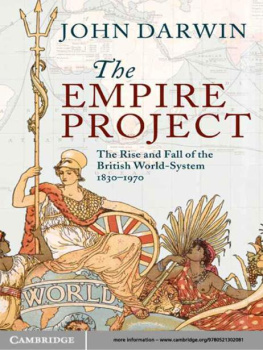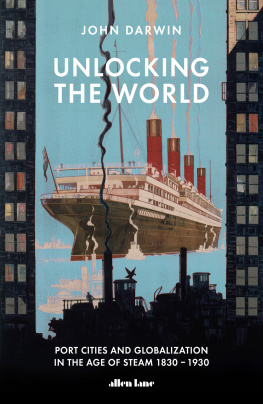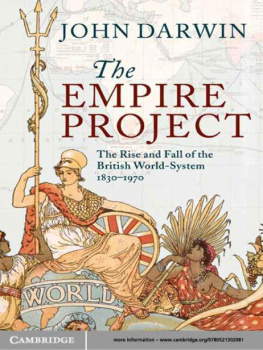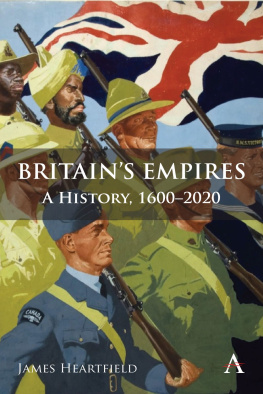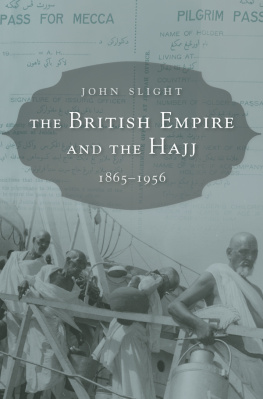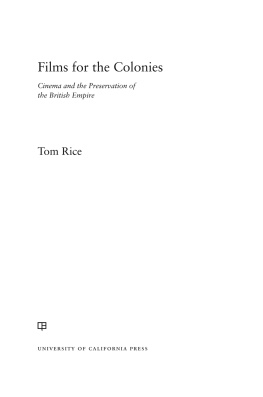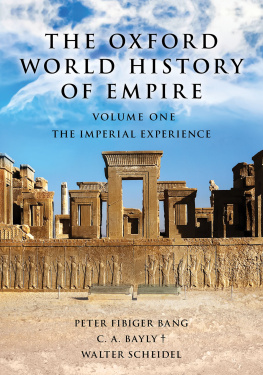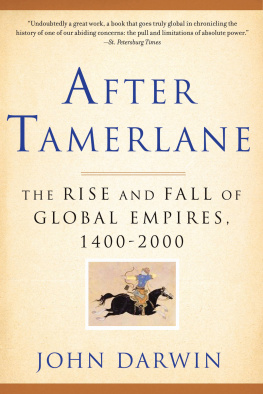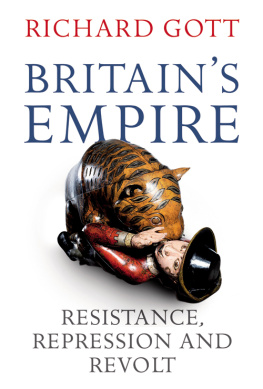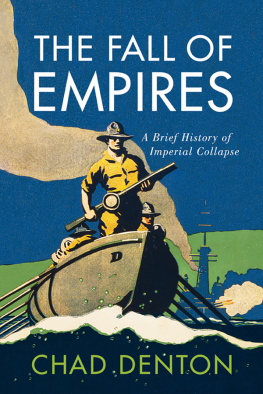
Just for Caroline
Contents
Few subjects in history evoke stronger opinions than the making of empire. Indeed, some historians of empire still feel obliged to proclaim their moral revulsion against it, in case writing about empire might be thought to endorse it. Others like to convey the impression that writing against empire is an act of great courage: as if its agents lie in wait to exact their revenge or an enraged imperialist public will inflict martyrdom on them. These are harmless, if rather amusing, conceits. But they reveal something interesting: that for all the ink spilt on their deeds and misdeeds, empires remain rather mysterious, realms of myth and misconception.
This is partly the result of thinking in monoliths. Empire is a grand word. But behind its faade (in every place and time) stood a mass of individuals, a network of lobbies, a mountain of hopes: for careers, fortunes, religious salvation or just physical safety. Empires were not made by faceless committees making grand calculations, nor by the irresistible pressures of economics or ideology. They had to be made by men (and women) whose actions were shaped by motives and morals no less confused and demanding than those that govern us now. This was certainly true of the British overseas empire. Far from being the mere handiwork of kings and conquistadors, it was largely a private-enterprise empire: the creation of merchants, investors, migrants and missionaries, among many others. Building an empire was not just an act of will or an imaginative impulse, though both were essential. It required a long chain of mundane activities to bring it about: the reconnoitring of targets; the founding of bridgeheads; the raising of money; the recruiting of sailors, soldiers, emigrants and adventurers; the rallying of allies (not least at court or in government); the writing of rules (not least about property in newfound lands); the regulation of trade as well as of moral behaviour in exotic locations; the framing of governments. It is not hard to see how much could go wrong. One of the most difficult tasks, but also one of the most vital, was settling the terms on which indigenous peoples and their leaders would become the allies, the clients or the subjects of empire. It is easily forgotten that across much of the world empire was made as much if not more by the local auxiliaries that empire-builders recruited as by the imperialists themselves. The result was an empire of hybrid components, conflicting traditions, and unsettled boundaries between races and peoples: a source of constant unease as well as extraordinary energy.
It was also, and crucially, an unfinished empire. When we stare at old maps of the world with their masses of British imperial pink, it is easy to forget that this was always an empire-in-making, indeed an empire scarcely half-made. As late as 1914 (sometimes imagined as the high noon of empire), the signs of this were everywhere: in the derelict state of some of Britains oldest possessions; in the exiguous strands of settlement that made up Canada and Australia; in the skeletal administration of tropical Africa, soon to be even more skeletal in the 1930s depression; in the chronic uncertainty over what kind of Raj would secure British control and appease Indian unrest; in the constant avowals that there would be no further imperial expansion, and the no less constant advances, a pattern that continued even after 1945; in the fuming and fretting of imperialists at home that public opinion was not imperial-minded enough. Indeed, the most ardent Edwardian imperialists believed that far from constructing a durable edifice that needed only periodic attention, the Victorian makers of empire had bequeathed their successors little more than a building site and a set of hopelessly defective plans.
If empire on closer inspection betrayed its improvised and provisional character, there were good reasons for this. Firstly, no single vision of empire had inspired its founders. Instead, society at home threw up a mass of competing interests and lobbies that pursued different versions of expansion and empire. Colonizing (with British migrants), civilizing (with British officials), converting (with British missionaries) and commerce (preferably without migrants, officials or missionaries) coexisted in uneasy and often quarrelsome partnership as the objects of empire. Colonial politics were the cockpit where the local protagonists of these parties struggled for mastery. Secondly, the command and control of this empire was always ramshackle and quite often chaotic. To suppose that an order uttered in London was obeyed round the world by zealous proconsuls is an historical fantasy (although a popular one). For this was an empire that depended on the cooperation of local elites, on the loyalty of settlers and the (often grudging) acquiescence of British officials, impatient of Whitehalls demands. None of these could be tested too far. Each was susceptible to myriad local pressures and problems unsuspected in London. Imperial governance was by necessity a series of compromises, some of them forced by the explosive rebellions Irish, American, Canadian, Indian and African that periodically blew it on to the rocks. Empire in practice required the continual adaptation of the methods of rule. Constitutional reform was an elegant term for bringing new players on to the political pitch, widening (or narrowing) the goal, or changing the shape of the ball. Its aim was not to achieve a final solution but to ensure the empires survival as a going concern to keep the game going. Who was subject to which laws remained, in many colonies, a quagmire of uncertainty. Thirdly, this intraimperial activity could not exist in a closed sphere of its own. Perhaps more than most empires, that of the British was exposed to external influences: the ideological claims and religious appeals that attracted its subjects; the effects of economic competition and crisis; and (most dangerously) the appearance of geostrategic challenge. The price of empire was constant attention to the unpredictable impact of geopolitical change, and a constant reshuffling of plans and priorities as new dangers or prospects appeared.
In this unstable world, no version of empire could be final, no imperial end-state more than a temporary respite. Nor until it happened could the end of empire be realistically envisaged, let alone planned for. Indeed, until the very last moment, the British themselves (certainly some of their leaders) went on believing that their empire could survive in some form, however reduced. Much of their policy in the era of decolonization (19451965) was meant to preserve an invisible empire of economic and political influence. Mundane reality was cruel to this dream. But its effects as that of empire itself linger still.
This book is meant to be read as a study in the processes of empire-building spread, in Britains case, over three centuries of expansion beyond Europe, and with their roots in the history of medieval English imperialism.
A book such as this could hardly be written without the assistance of a vast body of scholarship inadequately acknowledged in the references that accompany its chapters. I am also greatly indebted to my colleagues at Oxford and elsewhere from whose knowledge and insights I have tried to learn. In framing some of the questions that have shaped this book, I have been guided by the curiosity of both undergraduate and postgraduate students confirming the old adage that to teach is to learn. A particular mention is needed of the late Freddie Madden, whose monumental study of the constitutional practices of the British Empire from the medieval period to the end of empire is fundamental to understanding its byzantine workings. It is a work of extraordinary scholarship.
Next page

